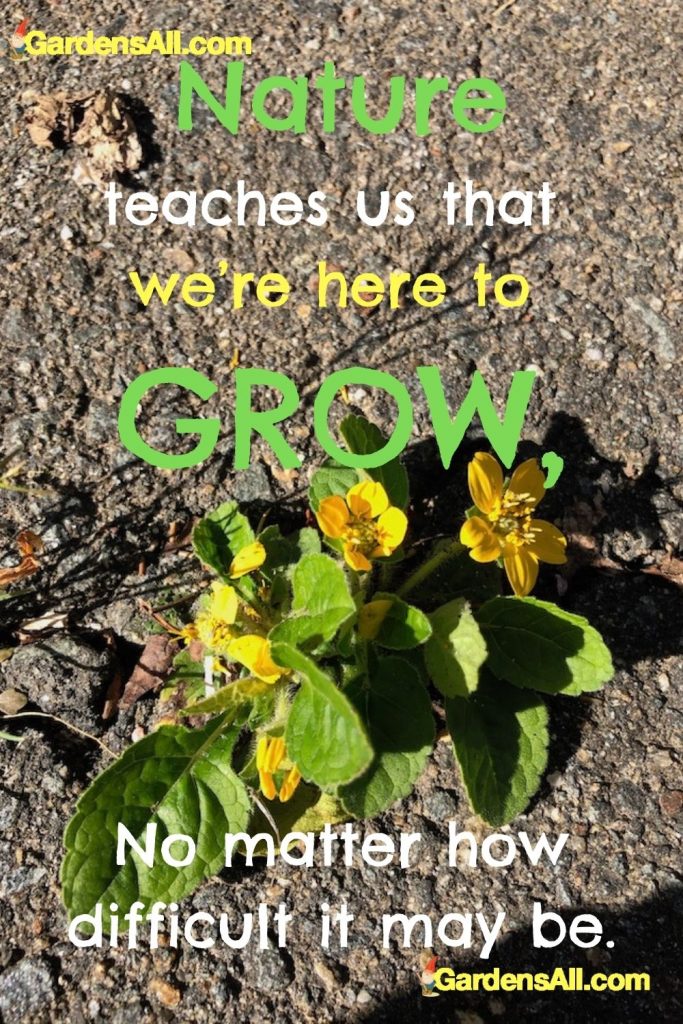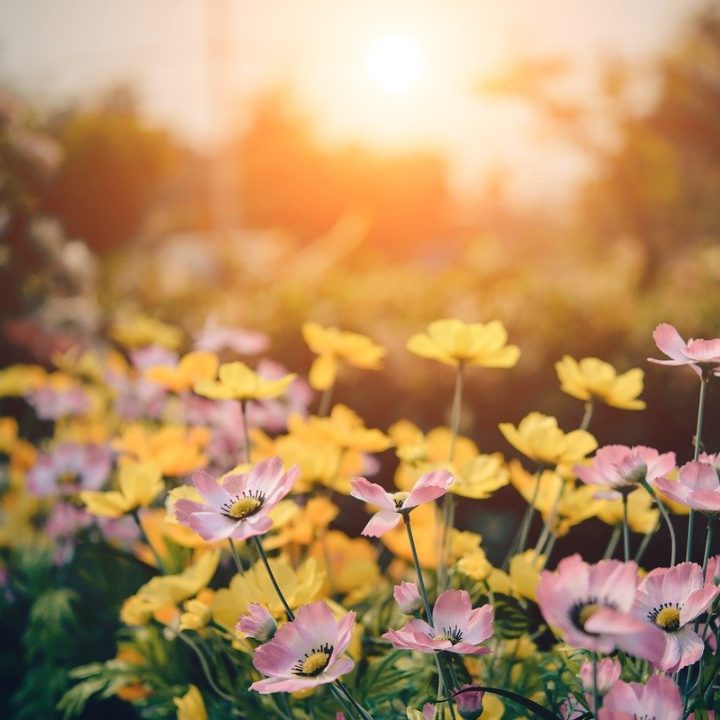Lessons in Abundance, and a Conversation With Mother Nature
We’ve lived in the woods for the past 30 years where it’s a lot like living in a treehouse. Between the woods and the little garden area we’ve managed to carve out, nature nurtures the soul daily, and natural wonders abound.
It’s spring, as this is being written, however, much of it is applicable any time of year, for if we gardeners and plant lovers aren’t foraging, sowing, growing or harvesting, then we’re probably tending potted plants, growing microgreens indoors, starting seedlings, and/or planning for when we will be.
Weeds Spring Up
In spring and summer, do you curse the weeds or put them to good use?
If you’ve been visiting this website for awhile now, you’ll know that we’re big on growing our own food, AND on making the most use of the plants all around us in our yard and beyond.
So… while we’re all busy planning, planting and dreaming of growing fresh tomatoes and other garden goodies, we can look around at what nature is providing in spring plants. There’s much to learn and put to use, edibles to discover and remedies to make.
Dandelion for Health and Detox
Like the fact that we’re growing dandelions on purpose. The greens make awesome salads, the flowers can go in salads and be made into teas and wine, and you can make a powerful dandelion detox tea out of dandelion roots. Nature provides all of that for our spring cleansing. Same with the ramps, aka wild leeks.
Chickweed Aids Fat Loss
Yep. There’s a scientific study that shows that chickweed tea blocks fat and carb absorption when consumed before eating, thus aiding in fat loss. You can read more about that here and we’ve included some recipes, such as chickweed pesto.
Ramps – AKA – Wild Leeks – for Spring Vitality
Since we’ve only planted our own ramps this season, they aren’t ready for harvest, so we actually bought some from a supplier in WV and had them shipped. We cooked them up in all kinds of ways and enjoyed all of it.
Ramps taste like an onion and garlic hybrid. If you sauteed onions and garlic together, that’s what it tastes like in food, but with the added nutrients of the ramp greens.
Market Growers Take Note
Ramps have become so popular and expensive, (commanding good prices at market, so something for market growers to consider). If you don’t have wooded areas for growing them, shade cloths and good soil could work for shading as well as for larger scale.
RELATED: Six figure profits from micro farming and market gardening.
No Ramps? Try Their Cousin
If you don’t have ramps, a close cousin you could put to use from your yard that springs up first and foremost everywhere in spring is wild onions and wild garlic.
Programmed to Poison
The fact that most of us grow up thinking of so many things as weeds to get rid of versus seeing them as food, medicine and remedies, is just a matter of exposure and conditioning. The white picket fenced yard of the 1950’s American industrial era dream did not include the chaos of a yard of weeds, but rather, the well kempt lawn for recreation.
Along with that came the need to get rid of the weeds.
Imaginary Conversation With Mother Nature
Imagine Mother Nature’s perspective:
“Here are some potent and precious plants for food and medicine. I’ve made them strong and resilient to keep you fed and well.”
Humans:
“Let’s poison this nuisance of a weed to get rid of it. It doesn’t belong in this beautiful lawn.” [that we can’t eat or use as medicine].
RELATED: Foodscaping
Lost Knowledge
We were surprised when we first learned that dandelions, along with some other common “weeds”, were brought to America by our European immigrant ancestors as hardy survival crops for food and medicine.
Now, as people become more aware of this LIVING food and medicine all around us, the weeds begin to take on names like henbit and ground ivy, plantain and clover, dead nettle and dandelion.
We’re growing Jerusalem artichokes (sunchokes), which is a nuisance weed plant in some areas for some people. Yet the sunchoke root is proven to lower blood sugar and aid diabetics in managing or mitigating diabetes.
It just makes so much sense. If you were embarking on a journey to a new land, while we’d definitely bring the seeds of our favorite crops, we’d also be sure to bring plants that can survive just about anything.
It also makes sense that as society moved from farm and field, woods and streams to subdivisions and paved streets, that we lost our connection with and knowledge of nature and our own natural roots. In fact, that separation of our nature from mother nature, actually began in the agricultural era, AKA, The Neolithic Revolution, thought to have begun about 12,000 years ago.
As humans discovered how to farm, they began to lose the connection to foraging and plant knowledge.
Positive Trends and Another Turn of the Spiral
Everything happens in cycles. It is after all, a spiral universe.
So it also makes sense — and is gratifying to see — that many are beginning to reverse that previous cycle with a return to natural foods and products and settings. Covid-19 has definitely propelled many into growing their own foods, as evidenced by seed companies being out of stock on many items for the past year and a half.
RELATED: Nature is nurture. (From our creator site).
NATURE TEACHES US, that often, the best things are all around us, ready to help.
~GardensAll.com

New (Old) Foods
When we were growing up, you’d definitely never see dandelion greens for sale. Nor spring mix. In fact, the only lettuce around to be bought was iceberg. Do you remember that?
Now, you can find so many varieties of greens, including dandelion, in the best grocery stores as well as on the gourmet menus of top restaurants. Same for varieties of plants to grow.
In our interview with Dr. Tom Cowan, on specialty crops to grow for profit, he said that our hunter-gatherer ancestors ate as many as 100 different species of plants. He’s the one who introduced us to longevity spinach – gynura procumbens and purple tree collards, and now we’re growing both.
Growing Food… and Growing Brain Cells!
There are so many wonderful varieties of all kinds of plants to grow. There’s an abundance of wild plants to forage and make use of. If we learned of a new plant, or something new about the plants we already know, each day of our lives, there would still be so much more to learn about.
We used to be taught that you can’t grow new brain cells, and that you’re stuck with the genetics you have, and that you can’t grow new bone after age 30.
Science has now proven all of those to be wrong. Epigenetics is proving that we can often turn our genetics off or on; that learning new things keeps creating new brain cells and synapses or connections. AND… that people in their 90’s are able to build new bone through resistance training and other exercises.
Lessons From Nature
The good news is that learning and trying new things keeps our brains young and supple, along with fresh garden veggies! The great news is that so much of what we need is only a sprouted seed away, and readily available for us all to grow or forage.
Many of the leaves of your garden crops are edible leaves, and even edible tree leaves!
It wasn’t until we started growing broccoli and cauliflower, peas and sweet potatoes, that it occurred to us to see if we could eat the greens. They’re perfectly edible and lovely additions to salads and as potherbs. The heavier greens cook up nicely, like kale or chard and can be used as you would those or spinach.
We also discovered that we could eat the flowers of broccoli, kale and arugula. And wow!… what a wonderfully potent flavor that tiny arugula flower gives, along with other brassica flowers! The little flower with a flavorful punch.
These plants are growing in our garden now and are available to harvest, flowers, leaves and stems, for food and remedies.
So while we’re engaged in gardening… let’s check out the leaves and weeds with a new perspective (if we haven’t already considered it). The weeds around us might just be a gift for us. We wrote more on that in weeds with purple flowers, and also on edible ground covers.
At the very least, heed the message your weeds reveal about your soil health.
Nature teaches us that — like the plants — we’re here to grow all the days of our lives, and if we get clipped in one area, we just grow back stronger, healthier and more resilient.
RECIPES (from our recipe site)
Summer Squash Lasagna
While summer squash isn’t producing yet, we’re getting ready for that event by testing new recipes like this summer squash lasagna, which is super simple and delicious.
Veggie Beef Stew
In many areas it’s still cool (or cold) enough for a good vegetable beef stew using winter carrots and whatever else you have on hand, such as finishing up some of your fresh-canned tomatoes
Steak Fajitas With Cilantro Lime Marinade
If your cilantro is ready, you might give this cilantro lime marinade for chicken or grilled steak fajitas.
Cheers from a beautiful spring day in NC. Hoping yours is bright and beautiful too. But no matter the weather outside, we can hold spring eternal in our heart and minds.
Nature teaches us we’re here to grow no matter how difficult it may be.

Contributions from the Community
What Nature has Taught Me
How would you complete this sentence…? “Nature has taught me……..”
Patience. Good things start small, but with care and attention, thrive.
~Colleen White
May you nurture the nature in and around you all the days of your life❣️🙏🏼😇
I’m LeAura Alderson, a garden, herb and plant enthusiast with a passion for discovering the many edible and medicinal benefits of the plants all around us, including the weeds! I’m a writer, editor and media publisher for our family of websites.
While I was certified in fitness and life coaching, I am NOT a health practitioner. However, I’m a lifelong health enthusiast, with a keen interest in healthy, organic foods and making home remedies and the content we share is from our own experience and usage as well as that extracted from scientific research so that you can explore further on your own.
Always seek the advice and guidance of your health practitioners first and foremost.
As a family we’re steadily expanding our gardening, experimentation and knowledge around all things gardening, edible landscaping, fresh organic foods and self sustainability with farming in our future. I also own and manage iCreateDaily.com, a site all about transformation through creation, and the power of positivity, optimism and mindset.

